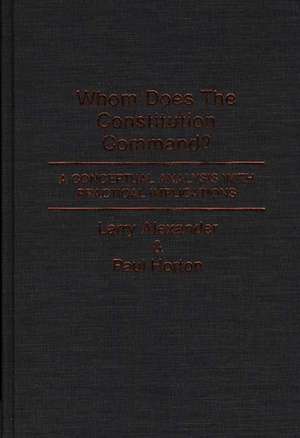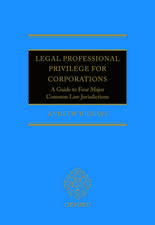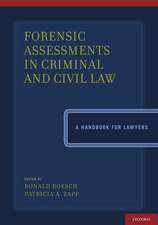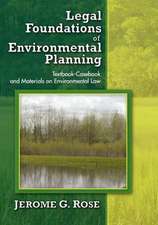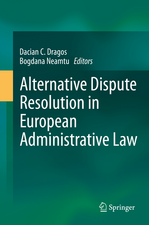Whom Does the Constitution Command?: A Conceptual Analysis with Practical Implications: Contributions in Women's Studies, cartea 42
Autor Larry Alexander, Paul Hortonen Limba Engleză Hardback – 31 iul 1988
Alexander and Horton have attempted to untangle one of the most difficult and potentially far-reaching questions in constitutional law: at what point does constitutional law leave off and plain old law' remain to occupy the US legal system's field of play? In addressing this question the authors take on two of the most murky concepts in constitutional law, state action; and under color of law.' In their attempt to make sense of these notions they develop models that potentially could provide coherent, principled answers to the problems created by the Supreme Court in its decisions in this area. . . . This work, the first monographic treatment of this question, is written purposely at a fairly high level of abstraction and is clearly intended for advanced students and judicial decision makers. Recommended for advanced students. "Choice"
Despite the guidelines provided in the Constitution, many fundamental constitutional issues remain open to debate after two centuries. One of the thorniest centers on the division of authority. Who is actually mandated by the U.S. Constitution to carry out the duties it imposes? Alexander and Horton address this question by developing several models of constitutional interpretation and applying them to state action, under color of law, and other complex doctrines in constitutional jurisprudence that have been created to deal with problems of distinguishing unconstitutional from merely illegal authority. Presenting three basic analytical models--legalist, naturalist, and governmental--together with several possible permutations, the authors clarify the assumptions underlying these current doctrinal tangles and illuminate many conflicts and inner inconsistencies of modern constitutional law. They examine the implications of each model in terms of its application to relevant court precedent and the way it would deal with specific constitutional provisions such as the Thirteenth and Fourth Amendments and the Commerce Clause. The authors conclude that only two of the possible models can be considered to be principled.
Din seria Contributions in Women's Studies
- 15%
 Preț: 430.04 lei
Preț: 430.04 lei - 52%
 Preț: 249.54 lei
Preț: 249.54 lei - 27%
 Preț: 446.20 lei
Preț: 446.20 lei - 28%
 Preț: 344.22 lei
Preț: 344.22 lei - 28%
 Preț: 436.57 lei
Preț: 436.57 lei - 28%
 Preț: 461.18 lei
Preț: 461.18 lei - 27%
 Preț: 437.40 lei
Preț: 437.40 lei - 38%
 Preț: 437.47 lei
Preț: 437.47 lei - 54%
 Preț: 151.42 lei
Preț: 151.42 lei - 14%
 Preț: 307.19 lei
Preț: 307.19 lei - 38%
 Preț: 342.88 lei
Preț: 342.88 lei - 42%
 Preț: 249.43 lei
Preț: 249.43 lei - 27%
 Preț: 443.40 lei
Preț: 443.40 lei - 43%
 Preț: 224.10 lei
Preț: 224.10 lei - 38%
 Preț: 437.84 lei
Preț: 437.84 lei - 39%
 Preț: 432.94 lei
Preț: 432.94 lei - 42%
 Preț: 271.39 lei
Preț: 271.39 lei - 33%
 Preț: 320.13 lei
Preț: 320.13 lei - 41%
 Preț: 306.74 lei
Preț: 306.74 lei - 24%
 Preț: 463.30 lei
Preț: 463.30 lei - 24%
 Preț: 465.50 lei
Preț: 465.50 lei - 38%
 Preț: 344.63 lei
Preț: 344.63 lei - 33%
 Preț: 319.64 lei
Preț: 319.64 lei - 31%
 Preț: 178.54 lei
Preț: 178.54 lei - 38%
 Preț: 444.60 lei
Preț: 444.60 lei - 38%
 Preț: 436.92 lei
Preț: 436.92 lei - 28%
 Preț: 437.31 lei
Preț: 437.31 lei - 54%
 Preț: 150.66 lei
Preț: 150.66 lei - 38%
 Preț: 440.36 lei
Preț: 440.36 lei - 55%
 Preț: 148.46 lei
Preț: 148.46 lei - 18%
 Preț: 320.60 lei
Preț: 320.60 lei - 42%
 Preț: 151.23 lei
Preț: 151.23 lei - 52%
 Preț: 300.01 lei
Preț: 300.01 lei - 33%
 Preț: 320.50 lei
Preț: 320.50 lei - 22%
 Preț: 306.73 lei
Preț: 306.73 lei - 40%
 Preț: 377.08 lei
Preț: 377.08 lei - 38%
 Preț: 344.63 lei
Preț: 344.63 lei - 27%
 Preț: 345.83 lei
Preț: 345.83 lei - 24%
 Preț: 463.64 lei
Preț: 463.64 lei - 38%
 Preț: 438.07 lei
Preț: 438.07 lei - 38%
 Preț: 440.79 lei
Preț: 440.79 lei - 28%
 Preț: 462.12 lei
Preț: 462.12 lei - 38%
 Preț: 438.76 lei
Preț: 438.76 lei - 14%
 Preț: 305.59 lei
Preț: 305.59 lei - 42%
 Preț: 251.27 lei
Preț: 251.27 lei - 41%
 Preț: 387.09 lei
Preț: 387.09 lei - 27%
 Preț: 439.85 lei
Preț: 439.85 lei - 38%
 Preț: 438.33 lei
Preț: 438.33 lei - 42%
 Preț: 251.27 lei
Preț: 251.27 lei - 51%
 Preț: 252.39 lei
Preț: 252.39 lei
Preț: 436.22 lei
Preț vechi: 706.86 lei
-38% Nou
83.51€ • 87.13$ • 70.00£
Carte tipărită la comandă
Livrare economică 12-26 martie
Specificații
ISBN-10: 0313262160
Pagini: 181
Dimensiuni: 156 x 234 x 13 mm
Greutate: 0.44 kg
Editura: Praeger
Seria Contributions in Women's Studies
Descriere
Despite the guidelines provided in the Constitution, many fundamental constitutional issues remain open to debate after two centuries. One of the thorniest centers on the division of authority. Who is actually mandated by the U.S. Constitution to carry out the duties it imposes? Alexander and Horton address this question by developing several models of constitutional interpretation and applying them to state action, under color of law, and other complex doctrines in constitutional jurisprudence that have been created to deal with problems of distinguishing unconstitutional from merely illegal authority. Presenting three basic analytical models--legalist, naturalist, and governmental--together with several possible permutations, the authors clarify the assumptions underlying these current doctrinal tangles and illuminate many conflicts and inner inconsistencies of modern constitutional law. They examine the implications of each model in terms of its application to relevant court precedent and the way it would deal with specific constitutional provisions such as the Thirteenth and Fourth Amendments and the Commerce Clause. The authors conclude that only two of the possible models can be considered to be principled.
Notă biografică
LARRY ALEXANDER is Professor of Law at the University of San Diego.
PAUL HORTON is Professor of Law at the University of San Diego.